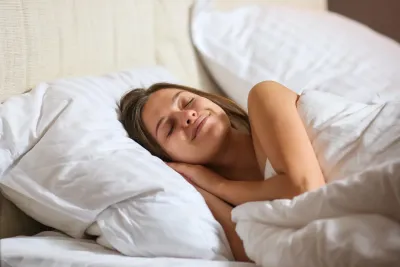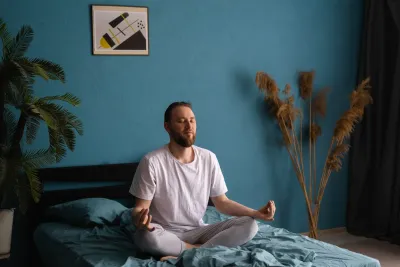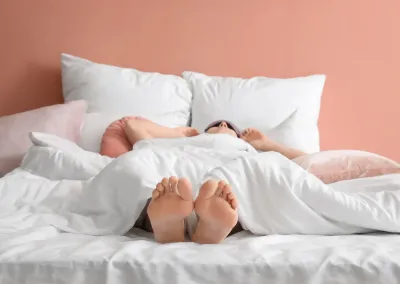Can a White Noise Machine Help You Sleep? Benefits & Tips
Ana Marie Schick: Resident Sleep Expert and Certified Health Coach • Jan 10, 2025

Key Takeaways
White noise supports sleep by creating a steady sound environment that prevents sudden noises from pulling your brain out of rest mode.
- White noise helps mask disruptive sounds like traffic, snoring, or late night activity, allowing your brain to remain calm and settled during sleep.
- Research shows white noise can significantly reduce the time it takes to fall asleep, especially for people sleeping in noisy environments.
- White noise can be added easily using fans, sound machines, or mobile apps, making it a flexible sleep aid for many routines.
- Keeping the volume below 50 decibels is important so the sound remains soothing rather than stimulating.
- White noise effectiveness varies by person, so testing it over several nights helps determine whether it improves your sleep quality.
Nothing beats waking up refreshed and ready to go. But miss out on sleep for even a few nights, and the fallout is real—foggy focus, short tempers, and that drained, groggy feeling that ruins both workdays and time with the people you care about.
In the quest for better sleep, nearly 38% of people turn to white noise or other sounds to help them sleep, according to a Newsweek survey. [1]
The concept isn’t new—back in the 17th century, Gian Lorenzo Bernini, while exploring ways to treat insomnia, created what’s considered the first white noise machine. Turns out, soothing sound has been a sleep hack for centuries.
A multitude of apps and white noise machines are available. People often use their humidifiers or air conditioning to generate white noise. Recorded stretches of 8-plus hours of white noise can be accessed online.
So, what is white noise anyway? What’s the most helpful way to use them? Most significantly, is there credible science to back it up?
Below, you’ll find those answers and more to help you make well-informed decisions about your sleep needs.
What is White Noise and Why It Can Help Sleep?
Think of white noise like a sound smoothie—it blends all the audible frequencies your ears can pick up and mixes them at equal intensity. The result? A steady, consistent hum that helps drown out other noises.
That’s why it’s often called “broadband” sound—it covers a wide range of pitches, creating a calming background that helps your brain tune out distractions and stay focused (or asleep).
What does white noise sound like? People say it’s similar to an untuned radio or TV sound. Some may compare the background noise to a “shh” or hissing sound. [2] [3]
Not sure if white noise is your thing? Give it a listen and find out.
White Noise Quiets Your Mind. Temperature Keeps You Asleep.
If sound helps you drift off but heat still wakes you up, it’s time to fix the other half of the equation. The Chilipad controls your bed temperature with water powered tech so your body stays comfortable through the night.
The Spectrum of Noise Colors
The spectrum of noise colors is a fascinating range of sounds that vary in frequency and intensity, each with unique characteristics and effects on the human brain. The Spectrum of Noise Colors
There are different types of colored noises; understanding these differences can help you choose the right sound to improve your sleep quality.
- White Noise: A steady, static-like sound that covers all frequencies equally. Think: a fan, AC hum, or TV static. Great for masking background noise and creating a consistent soundscape for sleep.
- Pink Noise: Softer and more balanced than white noise, with more emphasis on lower frequencies. Pink noise sounds like rain, ocean waves, or rustling leaves. Known to enhance relaxation and sleep quality.
- Brown Noise: Also called red noise, it’s deeper and richer than pink or white noise. Think thunder, waterfalls, or heavy rain. Brown noise is deal for drowning out low-frequency sounds and promoting deep sleep.
- Green Noise: Found in nature, with mid-range frequencies that resemble crashing waves or rustling trees. Green noise is soothing, less abrasive option than traditional white noise.
- Blue Noise: A high-pitched sound that intensifies with frequency. It’s like hissing pipes or screeching brakes—less common for sleep but may be helpful in specific cases.
- Violet Noise: Even more intense at high frequencies than blue noise. Think piercing squeals or sharp screeches. Not sleep-friendly for most, but some studies link it to improved sleep and reduced insomnia.
- **Grey Noise: **Engineered to sound equally loud across all frequencies to the human ear. Balanced and neutral, like soft wind or whispering. A good fit for those sensitive to more intense noise types.
How Does White Noise Work?
White noise doesn’t just make sound, it works with your brain to protect your sleep. Here’s how:
- Sound Shielding: White noise creates a steady, unchanging sound that masks sudden noises—like footsteps from the apartment above or the TV blaring downstairs. This makes it harder for those disruptions to wake you up. [4]
- Raises Your Brain’s “Auditory Threshold”: The consistent hum of white noise reduces the sharp contrast between background silence and unexpected sounds (like a barking dog). This makes those noises feel less jarring—and less likely to pull you out of sleep.
- Prevents Sleep Interruptions: With fewer abrupt changes in noise levels, your brain’s arousal system (especially the cerebral cortex) is less likely to react. That means fewer unwanted awakenings and more uninterrupted rest. [5]
Did You Know: Separated from masking unwanted noise, soothing sounds can also encourage relaxation. Much like how a warm bath preps your body for sleep, soothing sounds in calming your mind. [6]
Benefits of White Noise: Scientific Research
Sleep scientists, public health experts, and neurologists have extensively researched white noise's benefits and values. Many clinical studies have found that white noise effectively enhances the amount of sleep and quality we get each night.
Other studies have also confirmed that white noise benefits can positively impact tinnitus, sleep onset latency, and lowered night awakenings, resulting in a good night's sleep.
Sleep Onset Latency
Sleep onset latency refers to the time it takes to proceed from wakefulness to the initial stages of sleep. It involves how long it takes you to fall asleep. For adults, typical sleep latency varies between 10 and 20 minutes.
The appropriate amount of sleep latency influences overall sleep efficiency, meaning more time in bed is spent sleeping versus lying awake. [7] [8]
Evidence indicates sleeping with white noise is beneficial for helping someone fall asleep faster in a high-noise environment such as New York City. [9] Sleep onset latency also improved for a group of healthy college students using broadband/white noise, which improves sleep by masking disruptive sounds. [10]
Nighttime Arousals
Interrupted sleep patterns experienced regularly by hospitalized patients concern many healthcare professionals in a study on improving patients' sleep in a noisy intensive care unit (ICU), white noise machines significantly reduced nighttime arousals.
Furthermore, the arousals decreased substantially even when the study participants were exposed to peak noise levels (greater than 65 decibels). [11] Another study of patients hospitalized in a coronary care unit yielded comparable results. [12]

May Help with Tinnitus
White noise may be helpful for someone with tinnitus. [13] Tinnitus is a condition described as a strange ringing or buzzing in the ear. White noise can help mask the sound, which leans to be disruptive and more prominent at night when it's quiet.
Safety & Effectiveness
If you’re using noise colors to improve your sleep, it’s worth considering both the safety and the results. Here are a few things to keep in mind:
Volume Control
Keep the volume at a comfortable level. Make sure it's loud enough to block distractions, but not so loud that it becomes a distraction. If it's loud for long periods, it can damage hearing, so aim for balance.
Individual Preferences
The sound of white noise isn’t one-size-fits-all. Test it out (and other noise colors) with volume levels to see what works for you. What soothes one person to sleep might keep someone else wide awake.
Sleep Quality
Noise colors can improve your sleep by blocking background noise, easing your mind, and creating a steady sleep environment. The payoff? Falling asleep faster and staying asleep more consistently
Sleep Routine
Including such sounds in your bedtime routine is like giving your brain a gentle nudge that says, “hey, it’s bedtime.” Pairing them with a consistent routine, such as the same lights out and rituals, helps set the stage for better sleep habits and a better sleep hygiene.
Environmental Noise:
White noise does a great job of blocking out the chaos while sleeping. Whether it’s traffic outside, a snoring partner, or the general buzz of a busy household. White noise is ideal if you live in a city or anywhere background noise tries to disrupt your sleep.
Stable Sleep
White noise helps you fall asleep faster and stay there by smoothing out the bumps that usually wake you up. Brown noise, sometimes called red noise, takes it further, boosting sleep quality and even easing insomnia symptoms for some people.
Better Sleep
White noise and its colorful counterparts create a steady backdrop that helps drown out distractions, promotes relaxation, and maintains a consistent sleep environment. The payoff? Higher-quality rest and nights that actually feel restorative.
High Noise Environment
In loud environments, white noise can be particularly effective in helping you fall asleep and stay asleep. They can mask disruptive sounds and create a more peaceful sleep environment.
Sleep Onset Latency
It can help reduce sleep onset latency, making it easier to fall asleep. This can help people who struggle with falling asleep.

Choosing What Works for You to Improve Sleep
The million-dollar question: does white noise help you sleep? Sleep scientists, physicians, and public health professionals see white noise as one of the many techniques available to provide high-quality sleep and the development of a healthy lifestyle.
If you choose to try white noise, select a comfortable volume level, such as the level of a soft shower. Remember that white noise is only one tool in the selection of sleep hygiene strategies.
Below are just a few of the many alternatives available:
- Sleep Environment: Create a cozy sleep environment by keeping a cool, dark, decluttered bedroom.
- Sleep Schedule: Maintain a consistent sleep schedule, including a wake schedule, even on non-work days.
- Helpful Foods: Explore foods that can help improve your sleep.
- Bedtime Yoga: Practice Yoga Nidra, a bedtime yoga routine.
- Bedroom Temperature: Sleep cooler with comprehensive bed cooling system and mattress pad.
- Drinks for Better Sleep: Discover drinks that can improve your sleep quality.
Final Thought
Beyond white, pink, and brown noise, sounds like ocean waves can also be an effective non-pharmacological sleep aid, working to help you sleep and block out annoying noises and external disturbances. [14] Adjusting the volume might require a little trial-and-error.
Ultimately, however, you'll discover if white noise, pink noise, brown noise, or the calming rhythm of ocean waves enhances your sleep quality.
White Noise and Sleep FAQs
Who Benefits Most From Using White Noise?
White noise can be especially helpful for light sleepers, shift workers, people with tinnitus, and children who have trouble falling or staying asleep.
Can White Noise Help Me Sleep?
Yes, white noise can be very helpful for improving sleep. It works by masking distracting sounds like traffic, sirens, or even snoring. This consistent background noise can help you fall asleep faster and stay asleep longer by creating a more peaceful and consistent soundscape.
Is a Fan Considered White Noise?
Yes, the sound of a fan can be considered a form of white noise. While not as consistent or predictable as a dedicated white noise machine, the steady hum of a fan can effectively mask sleep disturbances like traffic, snoring, and other sounds helping you fall asleep faster and stay asleep longer.
Are There Other Types of “Colored” Noise Besides White Noise?
Yes! In addition to white noise, there are other types, including:
- White Noise: Even distribution of frequencies; masks sounds well.
- Pink Noise: Stronger low frequencies; sounds like steady rain or wind.-
- Brown Noise: Deep, low-frequency sound; similar to thunder or a distant waterfall.
- Blue Noise: Higher-pitched sound; more stimulating than soothing.
- Green Noise: Mimics natural environments like ocean waves or rustling leaves.
Is It Good for You to Sleep with White Noise?
Yes, It works by drowning out sudden sounds with a steady hum, helping your brain relax and stay asleep longer. Research backs it up—white noise can help you fall asleep faster and improve sleep quality. Whether it's a fan, app, or sound machine, just keep the volume low enough to protect your ears while you sleep.
Peer-Reviewed Research References
-
Riva, M. A., Cimino, V., & Sanchirico, S.
Gian Lorenzo Bernini’s 17th Century White Noise Machine.
The Lancet Neurology, 2017.
Study Type: Historical Medical Commentary
Key Finding: Historical evidence suggests early recognition of continuous sound as a method to mask environmental noise, illustrating centuries-old awareness of sound’s role in promoting rest and sleep.
View Study
Source URL: https://doi.org/10.1016/S1474-4422(17)30297-1
-
Summer, J.
White Noise.
Sleep Foundation, March 11, 2022.
Study Type: Sleep Health Education Resource
Key Finding: White noise may help improve sleep by masking sudden environmental sounds, making it easier to fall asleep and stay asleep in noisy environments.
View Resource
Source URL: https://www.sleepfoundation.org/noise-and-sleep/white-noise
-
Vinall, M.
Why White Noise May Help You Get the Best Sleep Ever.
Healthline, August 27, 2021.
Study Type: Health Journalism & Expert Commentary
Key Finding: White noise can reduce sleep disruptions by minimizing the impact of background noise, especially in urban or shared living environments.
View Resource
Source URL: https://www.healthline.com/health/sleep/why-white-noise-may-help-you-get-your-best-sleep-ever
-
Vinall, M.
Why White Noise May Help You Get the Best Sleep Ever.
Healthline, August 27, 2021.
Study Type: Health Journalism & Expert Commentary
Key Finding: The article further notes that consistent sound environments may support faster sleep onset by reducing sensory unpredictability at night.
View Resource
Source URL: https://www.healthline.com/health/sleep/why-white-noise-may-help-you-get-your-best-sleep-ever
-
Farokhnezhad Afshar, P., et al.
Effect of White Noise on Sleep in Patients Admitted to a Coronary Care.
Journal of Caring Sciences, 2016.
Study Type: Clinical Interventional Study
Key Finding: White noise significantly improved sleep quality and reduced nighttime awakenings among patients in coronary care units exposed to hospital noise.
View Study
Source URL: https://doi.org/10.15171/jcs.2016.011
-
Farokhnezhad Afshar, P., et al.
Effect of White Noise on Sleep in Patients Admitted to a Coronary Care.
Journal of Caring Sciences, 2016.
Study Type: Clinical Interventional Study
Key Finding: Findings reinforced that masking environmental noise with white noise can meaningfully improve sleep outcomes in high-noise medical settings.
View Study
Source URL: https://pmc.ncbi.nlm.nih.gov/articles/PMC4923834/
-
Stanchina, M. L., et al.
The Influence of White Noise on Sleep in Subjects Exposed to ICU Noise.
Sleep Medicine, 2005.
Study Type: Experimental Sleep Study
Key Finding: White noise improved sleep continuity and reduced sleep disruption in individuals exposed to intensive care unit noise environments.
View Study
Source URL: https://doi.org/10.1016/J.SLEEP.2004.12.004
-
Messineo, L., et al.
Broadband Sound Administration Improves Sleep Onset Latency in Healthy Subjects.
Frontiers in Neurology, 2017.
Study Type: Experimental Sleep Study
Key Finding: Broadband sound significantly reduced sleep onset latency in a controlled model of transient insomnia, supporting sound therapy as a non-pharmacological sleep aid.
-
Ebben, M. R., et al.
The Effects of White Noise on Sleep and Duration in Individuals Living in a High-Noise Environment.
Sleep Medicine, 2021.
Study Type: Observational Urban Sleep Study
Key Finding: White noise improved sleep duration and continuity among individuals living in noisy urban environments such as New York City.
View Resource
Source URL: https://www.sciencedirect.com/science/article/abs/pii/S1389945721002021
-
Messineo, L., et al.
Broadband Sound Administration Improves Sleep Onset Latency in Healthy Subjects.
Frontiers in Neurology, 2017.
Study Type: Experimental Sleep Study
Key Finding: Results further demonstrated that consistent auditory stimulation can facilitate faster transition into sleep under disruptive conditions.
-
Farokhnezhad Afshar, P., et al.
Effect of White Noise on Sleep in Patients Admitted to a Coronary Care.
Journal of Caring Sciences, 2016.
Study Type: Clinical Interventional Study
Key Finding: Repeated findings confirm white noise as an effective intervention for improving sleep in high-noise clinical environments.
View Study
Source URL: https://doi.org/10.15171/jcs.2016.011
-
Barozzi, S., et al.
Effects of Tinnitus Retraining Therapy with Different Colours of Sound.
International Tinnitus Journal, 2017.
Study Type: Clinical Therapy Study
Key Finding: Different sound frequencies, including white noise, helped reduce tinnitus perception and distress, supporting sound therapy’s broader role in auditory and sleep-related conditions.
View Study
Source URL: https://doi.org/10.5935/0946-5448.20170026
-
Yoon, H., & Baek, H. J.
External Auditory Stimulation as a Non-Pharmacological Sleep Aid.
Sensors, 2022.
Study Type: Narrative Review
Key Finding: External auditory stimulation, including white noise and broadband sound, shows promise as a safe, non-drug approach to improving sleep initiation and continuity.
View Study
Source URL: https://doi.org/10.3390/s22031264
-
Summer, J.
White Noise.
Sleep Foundation, March 11, 2022.
Study Type: Sleep Health Education Resource
Key Finding: Consistent white noise may support better sleep by reducing sensitivity to sudden environmental noise, particularly in shared or urban living spaces.
View Resource
Source URL: https://www.sleepfoundation.org/noise-and-sleep/white-noise









